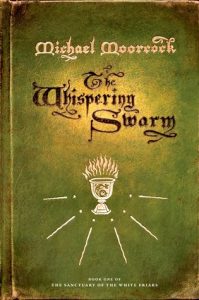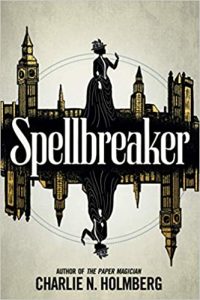Paul Di Filippo reviews Michael Moorcock
“Bulletin! Dateline: London. Michael Moorcock Enlists in Rudy Rucker’s School of Transrealism!”
Well, maybe that’s overstating the case for Moorcock’s employment of his own autobiography as the substrate for a work of fantastika, in the manner described in Rucker’s famous “Transrealist Manifesto.” And I’m sure Moorcock, one of cyberpunk’s—and hence one of Rucker’s—spiritual forefathers, was doing this kind of thing in smaller doses even prior to Rucker’s brainstorm. But still and all, the most recent novel from the New Wave Grand Master does fall squarely into the same camp as many of Rucker’s novels, also consorting with recent slipstreamy tales like Terry Bissons’s Any Day Now.
Up until page 35 of Michael Moorcock’s brilliant new fabulaic book, The Whispering Swarm, you assume you are reading a straightforward roman a clef, a subtly transmogrified (James Ballard = Jack Allard, etc., although plenty of real names are used as well) autobiographical memoir of a young fellow named Michael Moorcock as he navigates the streets of his beloved native London from birth in 1940 to circa 1956. But then onto the mundane scene comes one Friar Isadore, a strange humble little chap who is a member of the secretive order known as the White Friars.
It eventuates that the White Friars live in a magical neighborhood reachable thru big antique wooden doors found—if the percipient is lucky and sensitive enough—off a certain London mews. Inside is the realm known as Alsacia, a kind of “nexus of all realities” (to use the Marvel Comics phrase) where characters out of fiction consort with personages from history. At the ethical and moral center of Alsacia are the White Friars, a Christian order who received a special dispensation and charter centuries ago. And their ongoing mystical quest across the Black Aether seems to need the help of one Mike Moorcock to insure its success.
But for a while the heedless young lad is more besotted with the beautiful robber Captain Molly Midnight, and they go off on some transdimensional hijinks together. But as the lure and rewards and pleasures and challenges of mundane London reassert themselves, Moorcock strays from Alsacia. Years go by without a return visit. Our man is now in his twenties and well set-up in his professional writing life and a sideline of musical performances. He’s bedded many entrancing mortal women and finally married one. Their first child arrives. (And throughout all of this we are reveling in numerous genre tidbits, such as the role Harry Harrison played in the inspiration of Elric.) Perhaps the only drawback to banishment from Alsacia is “the Whispering Swarm,” an annoying susurrus of strange voices that comes and goes in Moorcock’s ears only.
Then, in his late twenties, a talking raven named Sam and a beautiful green Lagonda limo arrive to usher Moorcock back into the bosom of Alsacia. He becomes the live-in lover of Molly Midnight; takes lessons in “Radiant Time” from Father Grammaticus of the White Friars; and engages in various adventures straight out of Alexander Dumas. Best of all, when in Alsacia, the Whispering Swarm disappears. He thus balances a split existence, shuttling back and forth between the two spheres. In the mundane world, all sorts of vastly interesting career stuff is happening, as well as the entire Swinging Sixties. In the uncanny place, eternal battles and controversies ebb and flow. Moorcock participates fully in both realms. But this account—the first in a series—ends with another exclusion from Alsacia, voluntary this time.
Moorcock interweaves his two strands into a cat’s cradle of wonder, with each narrative illuminating and heightening its counterpart, so it’s patently stupid to try to assess them separately. Nonetheless, I feel compelled to try to disentangle them and gauge them apart from each other, just for the moment.
The autobiographical, mimetic portion strikes me as the superior half of the tale. Moorcock vividly conjures up the years from 1940 to 1970 in colorful, rhapsodic, heartfelt ways. He sketches characters deftly and deeply, not least of all himself, of course. He is unsparing of his own follies and ambitions, artistic and marital, facing the matter of his somewhat squandered talents and irresponsibility full on. Consider this soberly insightful passage, for instance, regarding the success Moorcock experienced.
But fame is power and power is a drug. You fascinate everyone, including yourself. You start getting as interested in you as they are. Life is so easy. Power is thrust at you from all sides. They want you to lie to them. Screw them. They wanted you to tell them stories. Sing them songs. In return you could do whatever you wanted.
This account sometimes resembles the cynical narratives of the Angry Young Man School, like John Braine’s Room at the Top. At the same time though, Moorcock is clear-eyed enough to recall and share the wonderful Edenic or Arcadian aspects of his life and the era at large. Regrets, despite everything, are pretty much nonexistent. And so, especially for the SF fan, this roman a clef aspect is fascinating.
The fantastical half of the book I found fun, but not an advance on Moorcock’s previous explications of his Multiverse. I was continually comparing it in my head to his Second Ether trilogy, which I regard as perhaps his best instantiation of this concept. He does introduce a few new refinements and speculations and historical allusions. But the novum is by now well worn.
Yet when you re-yoke these two halves together—as the book’s stout craftsmanship insists you must, ferrying you smoothly and blithely from one shore to another, in a craft whose keel is solid naturalism and whose sails are pure magic—then the result is an organic work that shows the whole man, and his dreams.









A nifty review, I don’t disagree with any word of it. I already read this novel. I don’t want to spoil anything for readers, but I wouldn’t really know how to promote it without saying the author is versatile, innovative and unpredictable. It’s a rather ordinary novel in which these writing qualities soon emerge. It’s also a bit nostalgic. But as is possible with many other fine writiers, anything old can be made new again.
A place like a mews can function as a muse, a mythical entitly that gives inspiration. A neat play on words, and a play on ideas has to be nearby. I’m not familiar with the word susurrus, a marvelous word, but one that has several meanings, one of which is voices in the head, which is traditionally and unfortunately associated with schizophrenia. This association is factually wrong, though it too often is used as an excuse for discrimination and persecution. How many people in the news–who were not black or colored–have been shot dead by police who called them schizophrenics? Even today we still live in a dark age when the self-porclaimed righteous hunt down the so-called heretics. I wish I could do without using the word “which”. Whoever hears a susurrus would be safe to keep it a secret.
Thanks for a perceptive review, Paul. Reference to Second Ether on the money. I suspect this is the last long sequence I’ll do so I’ll be running ahead of the reaper to wrap this bugger up with a nicer, bigger bang!